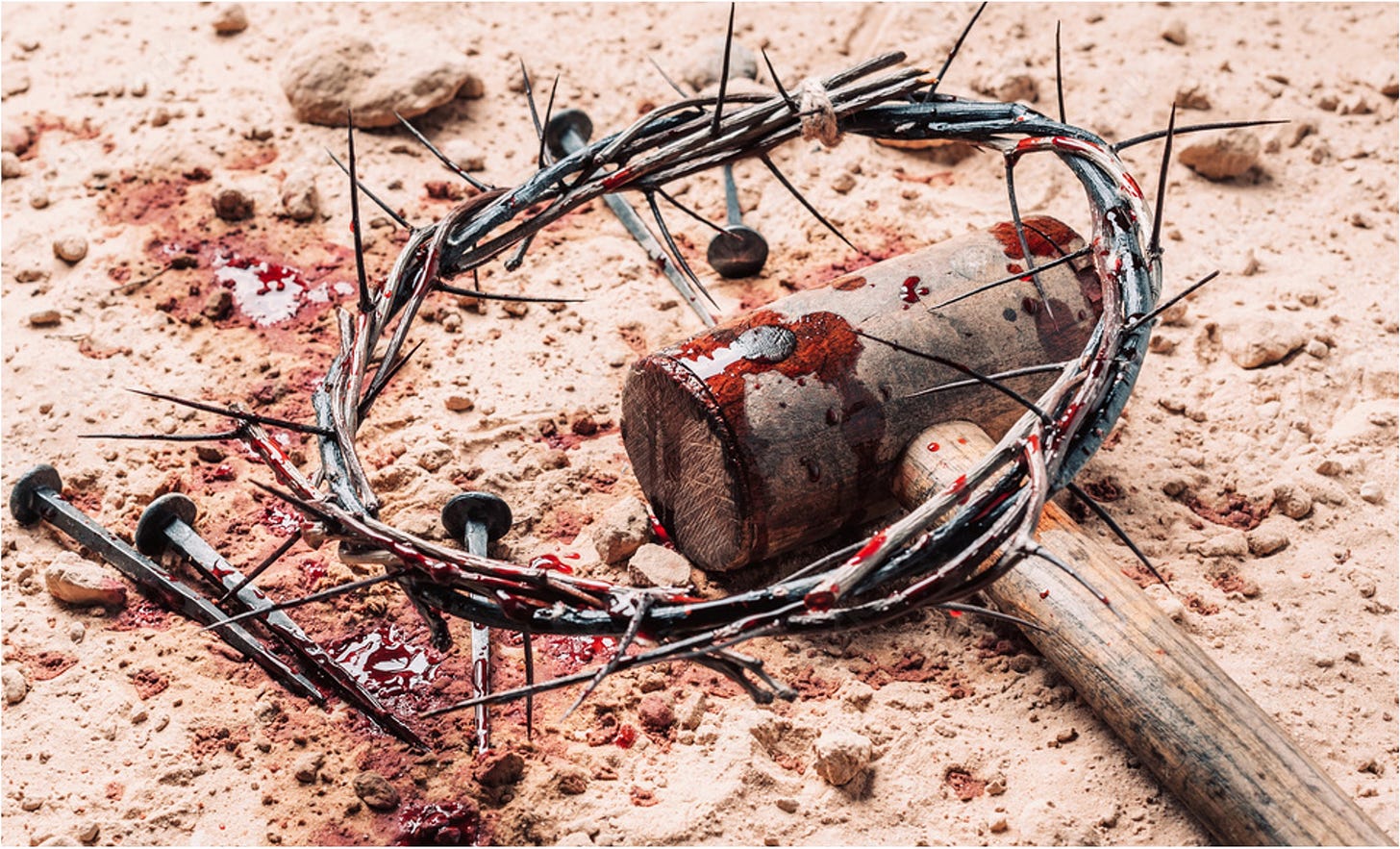I’ll preface this article by saying it is highly reactionary. I read something last night that bothered me profoundly and felt like it was worth sharing with others. The only reason I’m using this platform is because it’s too long to post on social media. I suppose it will also reinforce where we stand as an organization.
More on that in a moment.
Good Friday cannot be overlooked.
We can’t simply skip to the resurrection, because a bloody cross disturbs our modern sensibilities. It’s always been disturbing. It’s supposed to be disturbing.
In 1 Corinthians 1:23 Paul doesn’t mince words when he writes, “We preach Christ crucified- a stumbling block to the Jews and foolishness to the Gentiles”. But for us who are being saved it is the power of God (vs. 18).
The cross is a visible reminder of the love of God and the sacrifice that was made on our behalf. Increasingly, the idea of the atonement doesn’t sit well within our culture. It is considered offensive for three primary reasons.
First, it means people must recognize themselves as sinners. Second, it means they must admit they can’t do it themselves. Third, it means confessing they are in need of a Savior.
Which brings me to the main reason I’m writing.
Religious Trauma
The phrase religious trauma has been circulating a bit more these days, and last night I read a profoundly disturbing advertisement that sparked this article.
I would go so far as to say it was Satanic because of its massive deception.
It arrived on my Facebook feed in the upper right column under Sponsored Ads and was promoted as a benign approach to help the hurting and counsel the downcast. There was something about the picture that drew me in.
2 Corinthians 11:14 tells us, “Satan himself masquerades as an angel of light” and this was no exception.
The article was from the Global Center of Religious Research, and I was immediately interested. I was recently hired by Leadership Network to help curate stories on innovative practices for the church and I thought this article might contain updated research in that direction.
The man in the picture began to share his story. He wrote,
“I went through five mental health professionals before finding one who was educated on the causes, manifestations, and treatment options for Religious Trauma. When I first heard of Religious Trauma, I imagined extreme situations like physical violation or radical cult indoctrination. But I soon came to realize that it very closely describes my experience, and it explains the numerous trauma responses I carry with me.”
I’ll stop here to say that spiritual abuse is a real thing. I’ve witnessed the misuse of authority and heard very challenging stories from friends and colleagues . But this was different.
The victim in the testimony then went on to describe his upbringing as being very positive. He felt loved, secure, and safe. His faith was a source of strength in his life. I imagine he even attended a few Good Friday services over the years and felt comfort at the foot of the cross.
But much later in life, he felt shame and fear. But why?
It’s possible his shame had to do with a cloudy conscience. Perhaps he was living in sin or had walked away from Jesus. It’s possible his fear had more to do with living in a broken world and the violence that it creates. Instead, his therapist pointed out a different “problem”.
“My therapist helped me realize that my crippling emotional and mental health challenges stemmed from my own seemingly innocent faith upbringing. The religious teachings of my faith had taken a foothold deep in my psyche and created a toxic environment of fear and shame.”
The testimony continues for a few more paragraphs.
The offense of the gospel took a foothold deep in his psyche. He had been taught he was a sinner. He was taught he couldn’t save himself and was in need of a Savior. He recognized the reality of eternal separation from God.
The Professionals Are Here
It was at this juncture in the testimony that a new voice interrupted the advertisement. It was an authoritative voice. This was a person with degrees in psychology and counseling from leading institutions. He was not a pastor. No, this person was a “professional”.
The sponsored ad continues,
“Hello, my name is Darren Slade, President of the Global Center for Religious Research. Unfortunately, this is an all-too common story. Too often victims of toxic religion suffer in silence for years before encountering a trauma-informed therapist who is able to correctly identify and break down the walls of what’s really disrupting their daily life.”
Notice the language.
If you preach the gospel you are a perpetrator of trauma. If you speak of the atonement and crucifixion you are toxic. If you tell others they are born in sin and saved by grace through faith in Jesus Christ, then you are an abuser.
You are the oppressor and the people in your church are “victims of toxic religion”. Are you willing to live with that perception? Are you willing to continue to preach with that growing sentiment in our society?
The Global Center for Religious Research has already labeled you.
You hurt people. You oppress people. You indoctrinate people with hurtful ideas and a religious ideology of sin, suffering, and death.
You promote a bloody cross and especially on Good Friday.
It’s clear from the ad that Jesus doesn’t fix people with his crown of thorns or nail-scarred hands. No, that’s just the sad story of a great moral teacher showing people how to love their enemies.
Rather, the mental health professionals have the answers. They are the trained in this sort of thing. The ad continues, “We help people realize…
“They’re not sinful, they’re traumatized.”
“They’re not unworthy, they’re beautifully human and trapped in a trauma cycle.”
“They are not broken, they are responding instinctively out of a survival mechanism.”
“They do not need to leave their faith, but they do need to rewire some thought patterns and create healthy boundaries.”
Remember all those Bible verses about sin, sinners, Jesus, sacrifice, suffering, death, shame, guilt and all the rest? They have to go! Those thought patters are damaging and “toxic”. They make people feel bad about their sin and create Religious Trauma.
Not to worry, the mental health professionals will help “rewire some thought patterns”.
What Will You Preach?
This scenario is not a joke. It’s quite real.
I won’t list the names of all the “professionals” on this site, but if you’ve been in ministry for any length of time, you will recognize a few. Most have degrees next to their names.
This little advertisement has me fired up because it is so incredibly deceptive.
It is a deception being funded and promoted with hundreds of millions of dollars poured into mental health initiatives across the country- a Trojan Horse for false ideologies to continue to spread.
What once began with “rewiring thought patterns” of society’s view of sexual ethics and identity is now evolving to attack those who preach Christ crucified and the need for salvation from sin.
The doctrines of orthodox Christianity may one day be seen as “abusive” and “dangerous” to all people. Preaching the gospel may quickly be embraced by culture as “toxic religion” creating “religious trauma”.
I remember reading a poem once written after the Holocaust. The author wrote,
“First they came for the Communists
And I did not speak out
Because I was not a Communist
Then they came for the Socialists
And I did not speak out
Because I was not a Socialist
Then they came for the trade unionists
And I did not speak out
Because I was not a trade unionist
Then they came for the Jews
And I did not speak out
Because I was not a Jew
Then they came for me
And there was no one left
To speak out for me.”
Fill in the blanks with your religious doctrine of choice.
There are lines that need to be drawn and we need to count the cost. I believe we are going to see a growing price to be paid for believing that Good Friday is something more than a good moral teacher loving his enemies or a wonderful man dying for what he believed.
No, the gospel declares we are sinners. We can’t do it on our own. We need a Savior. We are only saved by grace through faith.
1 John 2:2 tells us, “He is the atoning sacrifice for our sins, and not only for ours but also for the sins of the whole world.”
Easter is coming and while the social cost for being a follower of Jesus is only going to increase, let’s not forget Good Friday along the way.







This is spot on Jon. I so appreciate your observation and thoughts on this. Good Friday is absolutely necessary to get us to the resurrection.
Thank you for your thoughtful article. Many are lifting psychology above Orthodox theology. I thank God for you and your ministry